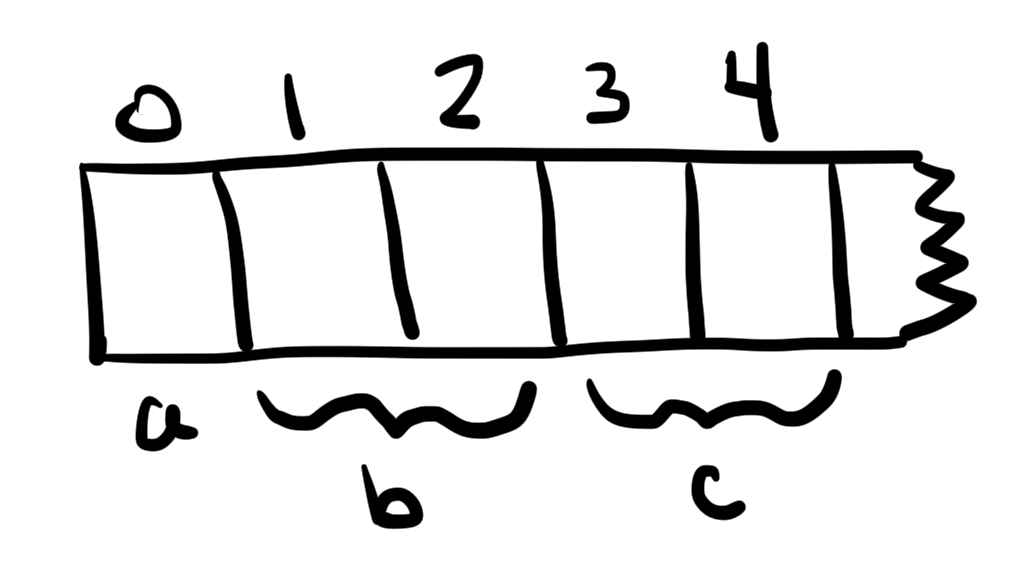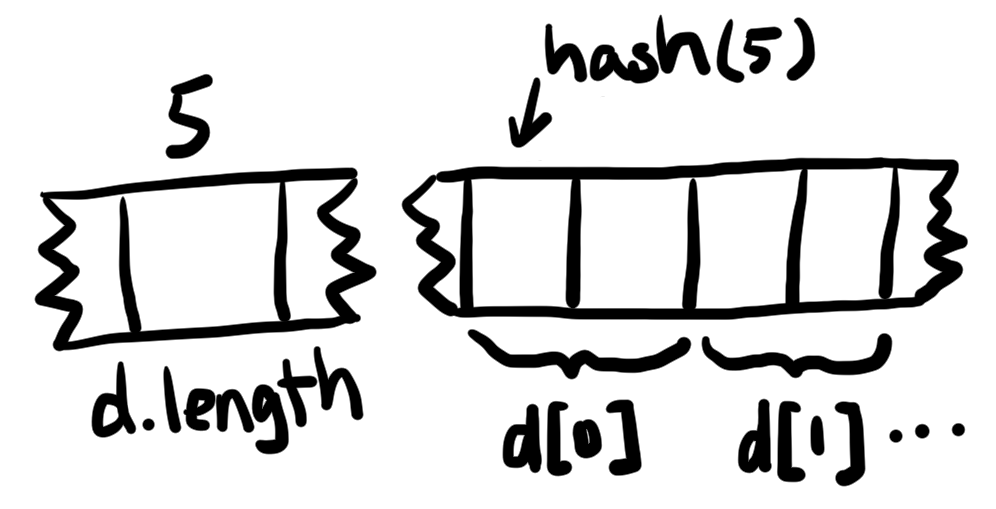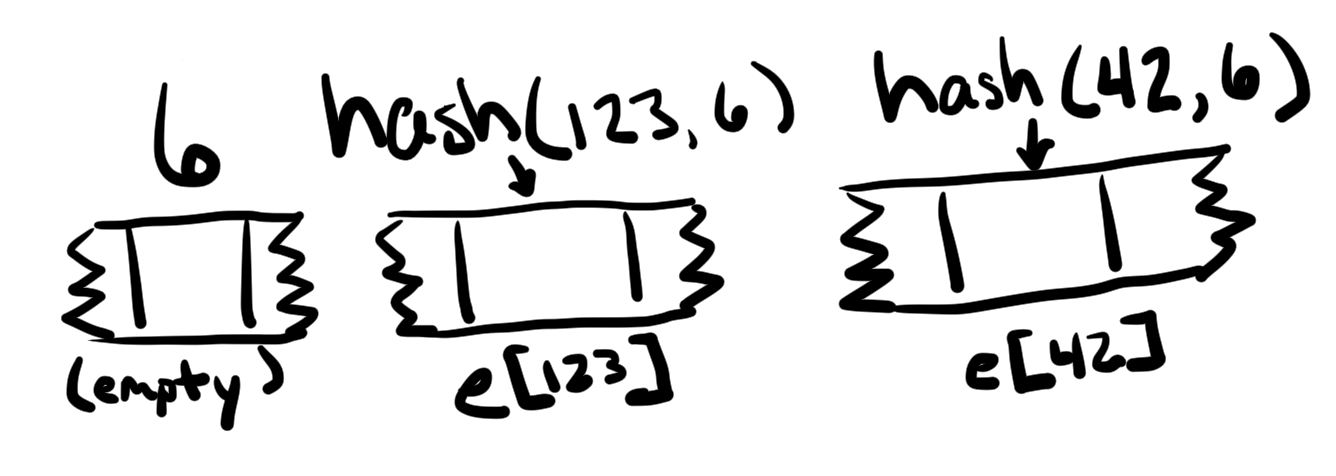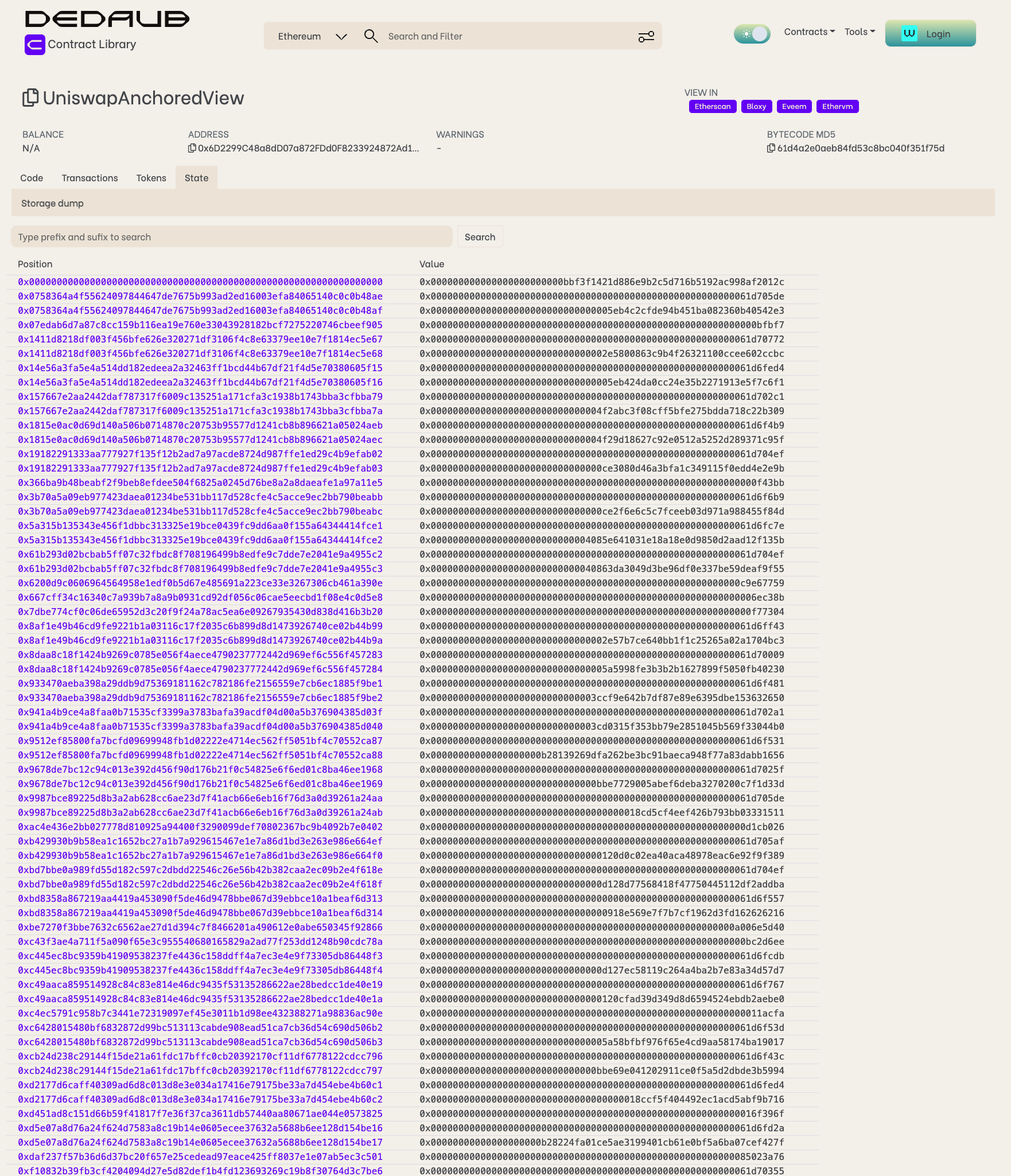Layout of State Variables in Storage
Every smart contract running in the Ethereum Virtual Machine (EVM) maintains state in its own permanent storage. You can picture the storage as a very large array. Smart contract storage have 2^256 32bytes slots.
- Data is stored contiguously item after item starting with the first state variable, which is stored in slot
0. - For each variable, a size in bytes is determined according to its type.
- If two consecutive variable can fit in one slot they are packed together from right to left.

Locating Fixed-Sized Values
Variables with known fixed sizes just use reserved locations in storage. These slots are determined at compile time, strictly based on the order in which the variables appear in the contract code.
contract StorageTest { uint256 a; uint256[2] b; struct Entry { uint256 id; uint256 value; } Entry c;}In the above code:
- a is stored at slot 0.
- b is stored at slots 1, and 2 (one for each element of the array).
- c starts at slot 3 and consumes two slots, because the Entry struct stores two 32-byte values.

Locating Dynamically-Sized Values
Using reserved slots works well for fixed-size state variables, but it doesn’t work for dynamically-sized arrays and mappings because there’s no way of knowing how many slots to reserve.
Due to the shere amount of locations available, 2^256 slots, we can choose storage locations at random without ever experiencing a collision. Solidity uses a hash function to uniformly and repeatably compute locations for dynamically-sized values.
A dynamically-sized array needs a place to store its size as well as its elements.
contract StorageTest { uint256 a; // slot 0 uint256[2] b; // slots 1-2 struct Entry { uint256 id; uint256 value; } Entry c; // slots 3-4 Entry[] d;}In the above code, the dynamically-sized array d is at slot 5, but the only thing that’s stored there is the size of d. The values in the array are stored consecutively starting at the hash (keccak256 hash function) of the slot.

The following Solidity function computes the location of an element of a dynamically-sized array:
function arrLocation(uint256 slot, uint256 index, uint256 elementSize) public pure returns (uint256){ return uint256(keccak256(slot)) + (index * elementSize);}Mappings
contract StorageTest { uint256 a; // slot 0 uint256[2] b; // slots 1-2 struct Entry { uint256 id; uint256 value; } Entry c; // slots 3-4 Entry[] d; // slot 5 for length, keccak256(5)+ for data mapping(uint256 => uint256) e; mapping(uint256 => uint256) f;}In the above code, the location for e is slot 6, and the location for f is slot 7, but nothing is actually stored at those locations. There is no length to be stored.
To find the location of a specific value within a mapping, the key and the mapping's slot are hashed together.
The following Solidity function computes the location of a value:
function mapLocation(uint256 slot, uint256 key) public pure returns (uint256) { return uint256(keccak256(key, slot));}
Combinations of Complex Types
Dynamically-sized arrays and mappings can be nested within each other recursively. When that happens, the location of a value is found by recursively applying the calculations defined above.
contract StorageTest { uint256 a; // slot 0 uint256[2] b; // slots 1-2 struct Entry { uint256 id; uint256 value; } Entry c; // slots 3-4 Entry[] d; // slot 5 for length, keccak256(5)+ for data mapping(uint256 => uint256) e; // slot 6, data at h(k . 6) mapping(uint256 => uint256) f; // slot 7, data at h(k . 7) mapping(uint256 => uint256[]) g; // slot 8 mapping(uint256 => uint256)[] h; // slot 9}To find items within these complex types, we can use the functions defined above.
To find g[123][0]:
// first find arr = g[123]
arrLoc = mapLocation(8, 123); // g is at slot 8
// then find arr[0]
itemLoc = arrLocation(arrLoc, 0, 1);
To find h[2][456]:
// first find map = h[2]
mapLoc = arrLocation(9, 2, 1); // h is at slot 9
// then find map[456]
itemLoc = mapLocation(mapLoc, 456);
You can use cast command that comes with foundry to inspect the storage of a contract:
cast storage -r https://eth-rpc.gateway.pokt.network 0x6D2299C48a8dD07a872FDd0F8233924872Ad1071 1
cast storage -r https://eth-rpc.gateway.pokt.network 0x6D2299C48a8dD07a872FDd0F8233924872Ad1071 0x0758364a4f55624097844647de7675b993ad2ed16003efa84065140c0c0b48ae

Dedaub provides an awesome toolkit to check the storage of a contract. Example: https://library.dedaub.com/contracts/Ethereum/6D2299C48A8DD07A872FDD0F8233924872AD1071/storage-dump

Inheritance
In a contract that inherits, the assignment works as follows:
- first, the slots are allocated to the inherited variables, from the leftmost contract to the rightmost
- finishing with the current contract.
contract Hello { string public hello = "Hello!";}contract World { string public world = "World!";}contract HelloWorld is Hello, World { string private greet = "Hello World!"; function getGreeting() public view returns(string memory) { return greet; } function getHello() public view returns(string memory) { return hello; } function getWorld() public view returns(string memory) { return world; }}hellogets assigned slot0worldgets assigned slot1greetgets assigned slot2
delegatecall
- The function
delegatecallcan be used similar tocall: the main difference is that only the code of the givenaddressis used, all other aspects (storage,balance, …) are taken from thecurrentcontract. - The purpose of
delegatecallis to uselibrarycode which is stored in another contract. - The user has to ensure that the layout of storage in both contracts is suitable for
delegatecallto be used.
Challenge:
// SPDX-License-Identifier: MITpragma solidity ^0.6.0;// Simple library contract to set the timecontract LibraryContract { // stores a timestamp uint storedTime; function setTime(uint _time) public { storedTime = _time; }}// SPDX-License-Identifier: MITpragma solidity ^0.6.0;contract Preservation { // public library contracts address public timeZone1Library; address public timeZone2Library; address public owner; uint storedTime; // Sets the function signature for delegatecall bytes4 constant setTimeSignature = bytes4(keccak256("setTime(uint256)")); constructor(address _timeZone1LibraryAddress, address _timeZone2LibraryAddress) public { timeZone1Library = _timeZone1LibraryAddress; timeZone2Library = _timeZone2LibraryAddress; owner = msg.sender; } // set the time for timezone 1 function setFirstTime(uint _timeStamp) public { timeZone1Library.delegatecall(abi.encodePacked(setTimeSignature, _timeStamp)); } // set the time for timezone 2 function setSecondTime(uint _timeStamp) public { timeZone2Library.delegatecall(abi.encodePacked(setTimeSignature, _timeStamp)); }}Memory layout of Preservation:
slot0: timeZone1Libraryslot1: timeZone2Libraryslot2: ownerslot3: storedTime
Exploit: Overwrite timeZone1Library variable with our own Exploit contract address; and call setTime on our Exploit contract address, that just modifies owner variable
Excercise: Try to solve the following Ethernaut challenges:
- https://ethernaut.openzeppelin.com/level/0xf94b476063B6379A3c8b6C836efB8B3e10eDe188
- https://ethernaut.openzeppelin.com/level/0x11343d543778213221516D004ED82C45C3c8788B
- https://ethernaut.openzeppelin.com/level/0x97E982a15FbB1C28F6B8ee971BEc15C78b3d263F
Table of direct types
| Type | Size in storage (bytes) | Padding in padded locations | Default value | Is key type? | Allowed in calldata? | Allowed as immutable? |
|---|---|---|---|---|---|---|
bool | 1 | Zero padded, left | false | Yes | Yes | Yes |
uintN | N/8 | Zero-padded, left* | 0 | Yes | Yes | Yes |
intN | N/8 | Sign-padded, left* | 0 | Yes | Yes | Yes |
address [payable] | 20 | Zero-padded, left* | Zero address (not valid!) | Yes | Yes | Yes |
contract types | 20 | Zero-padded, left* | Zero address (not valid!) | Yes | Yes | Yes |
bytesN | N | Zero-padded, right* | All zeroes | Yes | Yes | Yes |
enum types | As many as needed to hold all possibilities | Zero-padded, left | Whichever possibility is represented by 0 | Yes | Yes | Yes |
function internal | 8 | Zero-padded, left | Depends on location, but always invalid | No | No | Yes |
function external | 24 | Zero-padded, right, except on stack | Zero address, zero selector (not valid!) | No | Yes | No |
ufixedMxN | M/8 | Zero-padded, left* | 0 | Yes | Yes | Yes |
fixedMxN | M/8 | Sign-padded, left* | 0 | Yes | Yes | Yes |
| User-defined value types | Same as underlying type (except in 0.8.8) | Same as underlying type* | Same as underlying type | Yes | Yes | Yes |